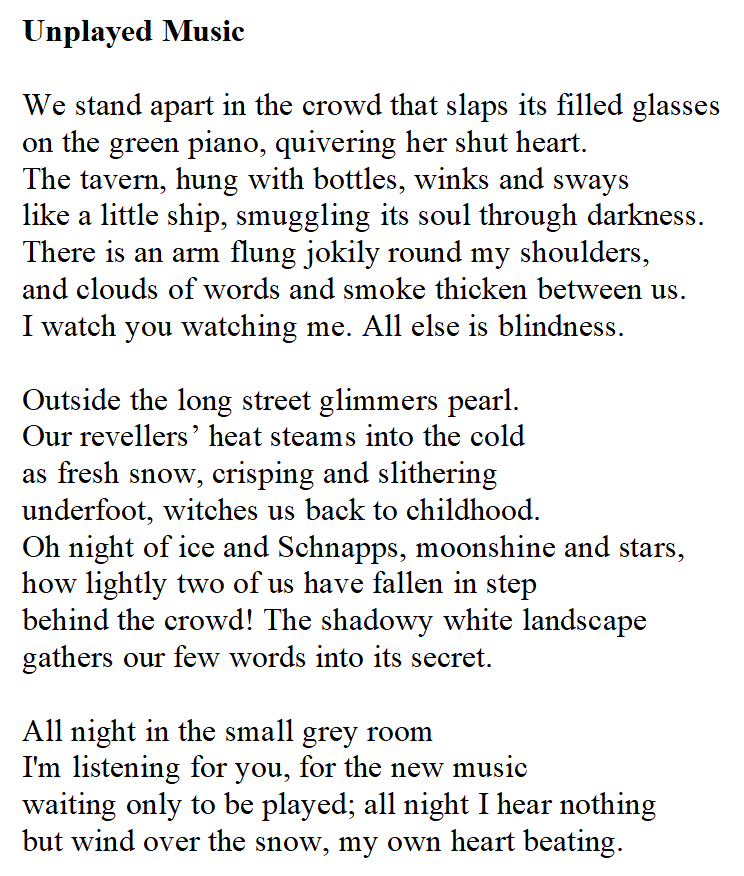Heard melodies are sweet, but those unheard
Are sweeter;
John Keats, Ode on a Grecian Urn
Following on from a recent post about poetry in Oxford, in this week’s post, I’m writing about one of those poets, Carol Rumens. I organised a reading for her at the Oxford University Poetry Society in the 1980s, and she was one of the best poets we ever invited.
Many of you will have read her regular poetry blog in the Guardian. Rumens says on her website that she doesn’t like to label herself: “I would rather describe myself simply as someone who loves language, and who tries to make various things with it – poems, chiefly, but also essays, plays, translation, occasional fiction and journalistic odds and ends.” As a poet who's published over a dozen collections, she is, of course, being modest.
I admired her poetry as soon as I heard her read it in Oxford back in the early 1980s, and I’ve never lost that admiration.
I remember her calm poise before the audience and also her kindness; she went out of her way afterwards to help place a poem of mine in a magazine.
Her collection, Unplayed Music,1 came out in 1981 and was a Poetry Book Society recommendation for spring that year. I was delighted to be able to buy the book, which I’ve had with me ever since.
The book is full of cracking poems in many different verse forms and with a wide range of literary and other references. It’s quietly ambitious poetry, which I still go back to. There are stunning and arresting images, such as in Coming Home:
The lawn blows like a tiny English Channel.
There’s a moving, unsentimental elegy for her father (December Walk), which talks of his
willingness, flat and English
as the whited winter sky,
to be always disappointed.
These lines help to show why one critic has described her as “perhaps the only contemporary female poet to have drawn obvious inspiration from the works of… Philip Larkin, whom she has admiringly described as ‘the great musician of his generation.’”
The poem Double Bed is a chilling portrait of a wife or partner apparently trapped in a relationship she feels she cannot leave:
and she will lie staring
at the dark for hours,
motionless, disarrayed
in the space he has left her.
The stunning and unexpected use of the word “disarrayed” here is typical of Rumens’ ability to startle and delight with her word choice.
I especially love the title poem of this collection, and I'm very grateful to Carol Rumens for allowing me to quote it in full:
I love the images of the tavern that “winks and sways/like a little ship” and the street that “glimmers pearl”. The bold use of “witches” as a verb is wonderful and forms part of a sequence of vivid verbs that create a strong sense of movement in the second stanza.
In the final stanza, the verbs become stationary or passive: “listening,” “waiting,” “hear",” “beating.” They bring the poem to a culmination which is about disappointed hope (the lover never appears) but also shows the speaker perhaps about to move beyond that disappointment. “My own heart beating” indicates solitude and the lack of that hoped-for music. But as the musical final line moves from the repeated soft and round “o” sounds of “over,” "snow,” and “own” to the harder edge of the “t” sounds in “heart” and “beating,” I sense the speaker not only steeling herself for living with this disappointment but also beginning to celebrate her solitude.
The main image of the “unplayed music” seems to transcend the minor disappointment of a tryst that never happened and hints at a life of the mind which is nourished as much by thought and fantasy as it is by memory of fact. The silence of the unplayed music will continue to play in her head and bring its own delights. And it makes me think of all the lovely music that never quite played for me but somehow has formed part of the rich musical score of memory that takes me back all the way to those days of poets and poetry in Oxford.
That’s my attempt at explaining part of the effect this beautiful poem has on me, but I’d love to hear your thoughts on this poem in the comments.
Published originally by Martin Secker and Warburg. The collection was joint winner that year of the Alice Hunt Bartlett Prize.
You can buy Unplayed Music and other poems by Rumens in this volume: Perhaps Bag: New and Selected Poems. New York: Sheep Meadow Press, 2017.
And her latest collection is The Mixed Urn, 2019, also published by Sheep Meadow.








The opening lines of the drinks slapped on the piano "quivering her shut heart" are a foreshadowing of the "unplayed music of the close". My siblings and I grew up practicing on an acoustic piano. But sometimes we experimented with it too. We discovered if you pushed down the damper/sustain pedal sudden and hard, all the strings would quiver in a faint echoing whisper of notes. There was something magical about the sound, a brief vision of the piano's full potential.
Thanks Jeffrey for introducing me to this poet.
"shut heart" is perfect. It made the closed piano come alive for me because only something once alive can be dead and coffined.
A poetry question for you from a poetry reading novice: after reading that perfectly placed and worded phrase, "shut heart," it was hard for me to appreciate what came next as much as I'd hoped. I couldn't get the image out of my head.
If a phrase or a word or a line stands out in poem, what does it do the rest of the poem?